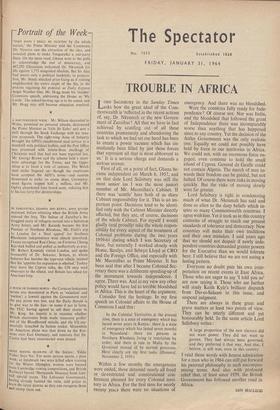Portrait of the Week— 'VERY SOON I SHALL BE ELECTED
by the whole nation,' the Prime Minister told the Commons; Dr. Nyerere saw the attraction of the idea, and revealed plans to make Tanganyika a one-party State. On the same road, Ghana went to the polls to acknowledge the end of democracy, and 467,292 Ghanaians welcomed Dr. Nkrumah for life against 1,775 misguided idealists. But Sir Alec had meant only a political landslide; in prepara- tion, Mr. Heath attacked price-fixing as if routing singlehanded the entire might of the Six, in the process regaining his pedestal as- Daily Express target Number One. Mr. Hogg made his 'maiden' Commons speech, addressing the House as 'My Lords.' The school-leaving age is to be raised, and Mr. Hogg may still become education overlord.
A BAD-TEMPERED WEEK: Mr. Wilson descended to Wales, promised no personal attacks, denounced the Prime Minister as 'little Sir Echo' and sent a chill through the Stock Exchange with his taxa- tion proposals. The right-wing Aims of Industry brought the GPO's unaddressed mail service to a standstill with political leaflets, and the Post Office was presented with ninety-three mailbags of Christmas mail that had not been reported lost. Mr. George Brown said the scheme held a short- term advantage for the Tories, and the Oppo- sition is to force a vote of censure. The Welsh steel strike lingered on—though the employers have accepted the AEU's terms—and seamen threatened to strike on cruise ships. Unemploy- ment figures topped half ,a million, and Mr. Ogilvy abandoned four board seats, reducing him ic his last forty-five directorships.
IN TANGANYIKA, UGANDA AND KENYA, army groups mutinied, before relenting when the British Army entered the fray. The Sultan of Zanzibar's be- draggled party of refugees moved into a Salvation Army hostel, and Mr. Kaunda became the first Premier of Northern Rhodesia; Mr. Field's trip to London for a 'final appeal' for Southern Rhodesian independence went almoit unnoticed. France recognised Red China; on Formosa Chiang Kai-shek huffed and puffed as ineffectively as ever. Mr. Robert Kennedy visited London, and spoke favourably of Dr. Sukarno; Britain, to whom Sukarno has become the type-cast villain, insisted that his 'appetite for expansion is whetted.' Turkey may leave the Cyprus talks, the UN may send observers to the island, and Britain has asked for American help.
A WEEK OF DASHED HOPES—the Corsican leukaemia serum was denounced in Paris as 'valueless' and 'useless'; a lawsuit against the Government over the pay pause was lost, and the Daily Herald is to give way to the Sun—in name if not in form, the TUC having agreed to sell their shares to Mr. King. An inquiry is to examine whether British electronics firms made 'excessive profits' out of the Bloodhound missile, and the US suc- cessfully launched its Saturn rocket. Meanwhile an American plane was shot down by the Rus- sians over East Germany, and rumours that Dr. Castro had been assassinated were denied.
MOST BORING HEADLINE Of the Sixties: 'Eddie Fisher Says No.' For more serious sports, a poor week; at Innsbruck two were killed when training for the Winter Olympics, women were banned from Cambridge rowing competitions, and British Railways barred 'Merseyside Maniacs' from foot- ball special trains. The Lebanese Government, having already banned the twist, told police to learn the latest dances, so they can recognise them and stamp them out.






































 Previous page
Previous page